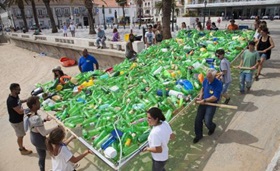Portugal : sorting systems for plastics - Arhive
Portugal embracing ‘hi-tech’ sorting systems for plastics
by Kirstin Linnenkoper
Portugal: ‘Plastic packaging sent to our recycling plants has seen a peak since around 2010,’ João Letras of Portugal’s Ponto Verde (Green Dot) collection system told the recent Plastics Recyclers Europe conference. Volumes grew from around 42 000 tonnes in 2010 to 115 000 tonnes last year for an increase in take-back from 33% to 76%. However, ‘the quality of the bales is now somewhat lower’, he observed.

Service-Links:
Portugal produces an estimated 4.7 million tonnes of municipal waste each year. The 22 recycling plants currently in operation have municipal solid waste processing capacities ranging from 22 000 tonnes to 190 000 tons per year, with the overall treatment capability standing at 2.2 million tonnes annually.
In many ways, the recycling sector in Portugal is performing above the average. In the case of plastics, the country has been recording a 70%-plus recycling rate since 2013, Letras told conference delegates in the Portuguese coastal town of Cascais. Overall, a total of 998 000 tonnes of plastics was collected for recycling in the country.
On the plus side, all 33 municipalities in a country of 10.5 million people are ‘on board’ with Ponto Verde. Another ‘positive development’ is that Portugal has steered away from energy recovery, Letras remarked. ‘Politicians have once again advocated against incineration plants in their new election campaigns,’ he added.
Letras expressed the hope that a sharper eye on sustainable practices would lead to an improvement in quality (mixed plastics purity is 94% on average). ‘It happens that sometimes the bales are not up to industry standards,’ he said. ‘We would rather have a little lower recycling rate and have better-quality bales.’
Currently, only 27% of facilities employ manual sorting whereas the other 73% are fully automatic. ‘Labour costs were low for a long while and we have only seen a real take-off of high-tech plants in the last few years, and especially an increase in optical sorting systems,’ Letras told the audience.
